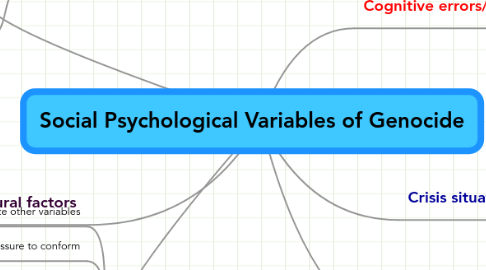Social Psychological Variables of Genocide
da Michael Rutledge


1. Innate cognitive predispositions
1.1. Cognitive miser tendency
1.2. Mental shortcuts (heuristics)
1.3. Can lead to cognitive errors/biases
1.4. 'In group bias'
1.4.1. Negative 'out group' view
1.4.2. Positive 'in group' view
1.4.3. Leads to stereotyping and prejudice
1.4.4. Negative attitudes toward 'out group'
1.4.5. Ideology of supremacy
1.4.6. Percieved threat orientation
2. Cultural factors
2.1. Violence acceptable
2.2. History of conflict
2.3. Aggression as a normative problem solving method
3. Leadership influence
3.1. Can manipulate other variables
3.2. Pressure to conform
3.2.1. Enhanced by strong authority figure
3.3. Eliminate opposing views
3.3.1. Attitude polarisation
3.4. Group formation
3.4.1. 'Group think'
3.4.2. Deindividuation
3.4.3. Lack of self-awareness
3.4.4. Perception of anonymity
3.4.5. Decreased perception of responsibility
3.4.6. Increased propensity for violence
